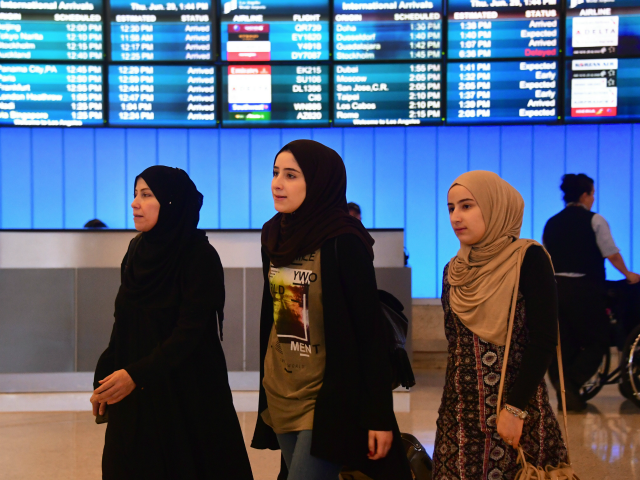White House officials have drafted a plan to block travel from several additional countries unless their governments tighten security on U.S.-bound flights, according to the Associated Press.
“A document outlining the plans — timed to coincide with the third anniversary of Trump’s January 2017 executive order — has been circulating the White House,” the AP reported:
But the countries that would be affected if it moves forward are blacked out, according to two of the people, who spoke to The Associated Press on condition of anonymity because the measure has yet to be finalized.
…
The countries on the proposed expansion list include allies that fall short on certain security measures. The additional restrictions were proposed by Department of Homeland Security officials following a review of security protocols and “identity management” for about 200 countries, according to the person.
The travel curbs are intended to force uncooperative foreign officials to help identify and block individuals who may be part of terror groups, including Islamic terror groups.
Critics describe the plan as an extension of the administration’s so-called 2019 “Muslim Ban” that includes Iran, Libya, Syria, Somalia, and Yemen — but also Venezuela and North Korea.
Despite that claim by pro-migration activists, the court approved the administration’s limited plans in 2019.
The updated security plan was outlined by CNN in October, and by Buzzfeed.com in January. CNN reported:
Trump administration officials are discussing adding more countries to the travel ban list, two sources tell CNN, potentially expanding the controversial ban that has been criticized as discriminating against Muslims.
An inter-agency discussion about imposing travel restrictions on countries that are not compliant with electronic documents and information sharing — a key focus of the administration — is underway, according to a senior administration official. Fewer than five countries are under consideration, the official said.The goal, the official said, is to “bring governments into compliance by using the power of access to the United States.” The travel restrictions would be tailored to the countries, if they’re added, and not impose a ban on them altogether, the official noted.
The security curbs have narrowed– but have not blocked — travel and immigration from the listed countries. Breitbart News reported January 6:
In 2o19, the State Department imported exactly 1,378 refugees from Chad, Iran, Iraq, Syria, Venezuela, and Yemen — six of the eight countries on Trump’s travel ban list, which also includes North Korea and Libya. This indicates a more than 783 percent increase between 2018 and 2019 of refugees from travel ban countries arriving in the U.S.
Almost half of those refugees, roughly 631, arrived in the U.S. from Syria — 115 of which were resettled in California, while 51 were resettled in Illinois, 49 were resettled in Michigan, and 41 were resettled in Texas.
Another 512 refugees arrived last year from Iraq, a country that remains on the travel ban list. A bulk of these Iraqi refugees resettled in California, Texas, Michigan, and Illinois. About 216 refugees arrived last year from Iran, the majority of which were resettled in California, 63, and Texas, 38.
The remainder of refugees from travel ban countries came from Chad from where eight were resettled, Venezuela had nine resettled, and Yemen had two who were resettled for all of 2019. No refugees arrived from Libya or North Korea.
Congress has given presidents broad authority to bar foreigners from the United States, the Supreme Court said in 2018. A statement from the White House said, “The Supreme Court has upheld the clear authority of the president to defend the national security of the United States … This ruling is also a moment of profound vindication following months of hysterical commentary from the media and Democratic politicians who refuse to do what it takes to secure our border and our country.”

COMMENTS
Please let us know if you're having issues with commenting.